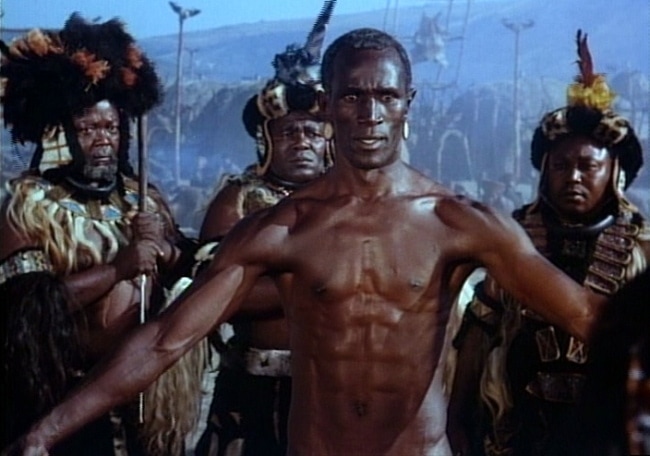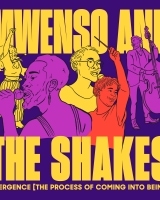Night-1 Hour-2

Shaka: “The only way to store ideas, feelings, is in the mind and in the heart. And my future generations will hear the voice of the wind bringing messages from long ago of Shaka.”
Piet: “Yes, and that voice will speak of tyranny.”
Shaka: “Is that what you whites think of me? A tyrant?”
Piet: “That is the message brought to them by the wind.”
— Shaka debates the value of writing with his new interpreter, Piet Vegte, who is the first European he has conversed with. From hour two of Shaka Zulu.
The message Europeans have heard of Shaka, portraying him as a Zulu Mephistopheles, is put to the test in hour two. So it is fitting that the action centers on the alleged resurrection powers of Dr. Henry Fynn, since the actor playing him, Robert Powell, is best known for portraying Jesus.
A decade after starring in Jesus of Nazareth, Powell again displays (seemingly) supernatural powers over life and death while his Dr. Fynn journeys toward Shaka’s capital of Kwa Bulawayo. As the British diplomatic party is being led near a small Zulu village, an apparently-dead girl is carried past them, on the way to be buried. However, Fynn catches sight of the girl’s fingers twitching, and abruptly halts the funeral party. He quickly assesses that she is in a fever-induced coma, and convinces the Zulus to let him treat her (much to the annoyance of the local “isangoma”). When the girl recovers, Farewell aims to let the Zulus think it the result of something other than strong medicine. In fact, this incident hit close to home for series writer Joshua Sinclair, as he described in a 2013 interview for my film site Camera In The Sun:
That is a real story that happened to me in India when I was a doctor there. Somebody called me and said, “I hear from the sisters that you know how to resurrect.” And I couldn’t suddenly go into a whole lesson of theology and doxology there. So I had to say, “Whoa, wait a minute. What are we talking about?” And they said, “I want you to bring her back to life.” Then I went through a whole other [approach] of, “Do you see where she is? Do you really want her to come back from there?” And so, I got out of that.
The incident is also reminiscent of a scene in the John Huston-directed The Treasure of the Sierra Madre, where an old prospector seemingly resurrects a near-drowned young boy (and is rewarded with deep gratitude from the boy’s village). But Fynn’s concern with the ambitious Farewell’s supernatural spin on the incident closely echoes another Huston-directed film, The Man Who Would Be King (about two unscrupulous 19th Century British soldiers who con their way into ruling an isolated kingdom in Kafiristan, with disastrous results), which he expresses soon afterward:
Fynn: “A man without scruples could very easily become a god in this country. Couldn’t he… lieutenant? I’ll have no part of it.”
Farewell: “No, I shan’t expect it of you. But when he learns of this miracle — and I suggest of you that Shaka will, and you will be in no position to refuse. Besides Fynn, this fits awfully neatly into your Faustian notion of the Zulu king, doesn’t it?”
Fynn: “Who better suited to deal with Mephistopheles…”
Farewell: “Than you, Doctor Fynn. Than you.”
Fynn considers Farewell’s reasoning a moment, then laughs, and returns to his journal, which serves throughout the miniseries as useful voiceover exposition — including for things like the unusual nickname the Europeans pick up:
We’d been given the name “Swallows” by our Zulu hosts, because like those tenacious little birds, we’d apparently like magic come across the sea.
But Fynn’s light journaling tone soon turns dark:
Our journey was, unbeknown to us at the time, being watched closely by the most powerful isangoma, or witch doctor, in the realm. News of our medical exploits had spread like wildfire, and we were to learn later that we’d incurred the wrath of the witch doctor fraternity.
In fact, the night before the “Swallows” arrive at Kwa Bulawayo, that most-powerful isangoma, the milk-eyed ancient Sitayi, has a private audience with Shaka (after entering his kraal with her three pet hyenas) and urges the king not to meet with the Europeans:
Beware, baba. Those who wish to be served by magic often become its servants. We have no need of their powers. You are Zulu. You possess the heavens.
Shaka is not swayed, so Sitayi invokes the prophecy that paved the warrior king’s path to rule over the Zulus:
Remember the condition of the prophecy. Do not defy the ancestors by reaching for powers that are not of your heritage, or the heavens will destroy you through your own blood.
Shaka’s general, Mgobozi, is also unnerved by the Europeans, having spent a week traveling with them to Kwa Bulawayo, and witnessed Fynn’s alleged resurrection powers, as he duly warns his king:
Mgobozi: “The whites are magicians, Shaka. They work with illusion. You have taught us to live in reality. Even if the whites had a hundred lives each, those lives would not be worth the life of a single dedicated Zulu. Because we are superior.”
Shaka: “The leopard is also superior, Mgobozi. He’s a sovereign among the masters. Each proud day of his life is worth 100 days in the life of a raven. Yet, if the leopard was offered wings to fly, he would be foolish to refuse them.”
Mgobozi: “No, Shaka, the leopard’s kingdom is the earth! On the earth he is the master! In the skies, he becomes a victim. If the whites offer you wings, it is because they wish to make you their victim.”
However, it is the power of hooves, not wings, that Shaka is first drawn to. After his speedy warriors lose a foot race to Farewell and Fynn’s horses, Shaka climbs atop the doctor’s brown mount, and charges around the kraal, his iklwa spear held high, shouting his delight at gaining an equine battlefield advantage. Later, the Europeans present Shaka with peaceful gifts, including an English bulldog, a caged white dove, and a silver hand mirror — closely watching the king linger a moment over his own appearance, and reflecting the advice of Farewell’s wife, Elizabeth to target Shaka’s vanity (“the greatest weakness of all men, whether they be Huns, Englishmen, or Zulus”), while Fynn observes yet another reference to Mephistopheles:
How very poignant. Centuries of poets, and not one of them has thought of giving the fallen angel a mirror.
Then, the momentary calm is shattered when the girl that Fynn saved from a live burial is dragged screaming before the assembly. Shaka, determined to confirm if the Europeans can indeed resurrect the dead, poses them a line of questions:
Shaka: “In your country, to whom does life belong? To the king, or to his subjects?”
Fynn: “In our country, each man is lord of his own life, and only his own life. King included.”
Shaka: “Can your king make you go to war?”
Fairwell: “Yes.”
Shaka: “And can you die in war?”
Fairwell: “Yes.”
Shaka: “Then you are wrong. Your king owns life. Here, life belongs to Shaka. Her life belongs to Shaka. And you had no right to give her life without the great elephant’s permission.”
With that, Shaka’s warriors stab the girl to death, and Fynn is put on the spot to repeat his earlier “miracle.” For Sinclair, incorporating his own encounter with resurrection to explore Shaka’s logical response was crucial for a miniseries that aimed to seamlessly mix supernatural elements with brutal reality:
What I wanted to show from a medical point of view, and also because I love mythology, is that this great empire was intelligent enough to call the bluff of our culture. And that’s what Shaka did.
As Fynn hesitates over the girl’s corpse, able only to pantomime a useless check-up, Mgobozi’s warning replays through Shaka’s mind. At this crucial moment, the king could choose Zulu power, and fully embrace his prophecy — simply order the Swallows to be executed, then overrun the Cape colony, and change the course of the region’s history. Yet, at this same moment, one of the Swallows presents Shaka with a mechanical music box. As the chimes play, the king makes his choice, and allows himself to turn his attention to this new delightful European power, rather than push the issue of “resurrection” any further. Fynn, however, is all too aware of just how close they have come to execution, and his narration concedes that Shaka has intellectually outmaneuvered them at every turn thus far:
If we were going to play this game, we were going to have to play it a lot better than this. For the pieces had been set, and checkmate could mean death for all of us…

